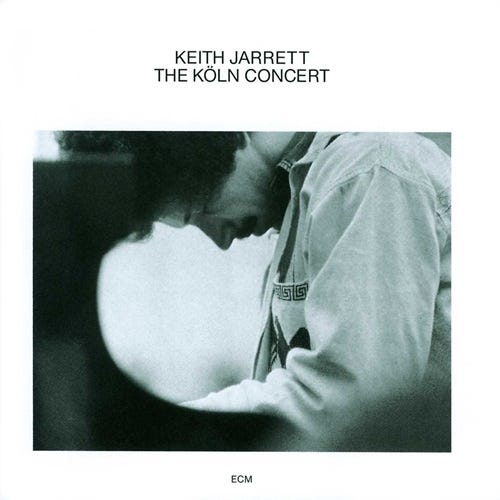The 100 Best Live Recordings - No. 98: Keith Jarrett - The Köln Concert (at 50)
Keith Jarrett - The Köln Concert (ECM, 1975)
Spontaneous Invention and Improvisation.
I suspect that Keith Jarrett and ECM Records founder Manfred Eicher didn't foresee the future popularity and influence of The Köln Concert when they recorded the performance at the Köln Opera House on Friday, January 24, 1975. The recording effectively put both men on the artistic map, with Jarrett emerging from his work with Miles Davis and Eicher, having founded ECM in 1969. Jarrett had previously released the solo studio recording, Facing You (ECM, 1972), which was recorded in Oslo, Norway during some downtime while touring with Miles Davis’ Septet — the same band, in aggregate, who recorded Miles Davis At The Fillmore (Columbia, 1970) The Cellar Door Sessions (Columbia, 2005/1970) and Live-Evil (Columbia, 1971). During the Cellar Door performances, Davis allowed Jarrett room to play four solo improvisations. Jarrett codified this approach on Facing You, making creative waves with its fresh, improvisatory nature.
Jarrett prefaced The Köln Concert with his first live solo recording, Solo Concerts: Bremen/Lausanne (ECM, 1973). The pianist established his niche early in free but cogent improvisation that is engaged at a uniformly high and provoking level. Jarrett possesses a bottomless and fecund sense of rhythm and melody, spinning out new lines and themes that are old souls renewed. A lifetime of listening and playing music fills his improvisations with a gentle pathos, making them sound friendly and familiar. Jarrett proves that a simple two-chord figure provides ample harmonic underpinning for an endless stream of ideas springing from his ever fertile imagination.
The commercial release of The Köln Concert celebrates its Golden Anniversary, 30 November 1975. It was a release that told artists that extended improvisatory was not only permissible, but had value among listeners. It also, in part, helped catalyze the rise in Ambient and New Age piano that would occupy the next 30 years of recording. This was piano playing, fully realized (in the moment of creation) for immediate consumption. Jarrett presents the music for listening, considering, and just as background ambiance. And that is okay.
In the 26 minutes of of “Part 1,” Jarrett summons many spirits. Over two chords, the pianist finds a panorama: easy listening, anthemic celebration, soundtrack documentation, free classical, well behaved avant garde, pastoral promise, gospel fervor, all presented as a stream of consciousness alpha to omega. “Parts IIa-c” is a concerto with no orchestra, propelled by Jarretts sure and inventive left hand. Is this jazz? Is this classical? Does it make any differnence?
No.



As a music undergrad at Oregon, I became aware of Jarret and how he was embraced for his extended improvisations at the piano. During that time, as I was working at the piano, just an awareness of Jarret's approach being admired influenced me. I listened to him a little bit then and over the decades. I respect him.
❤️!